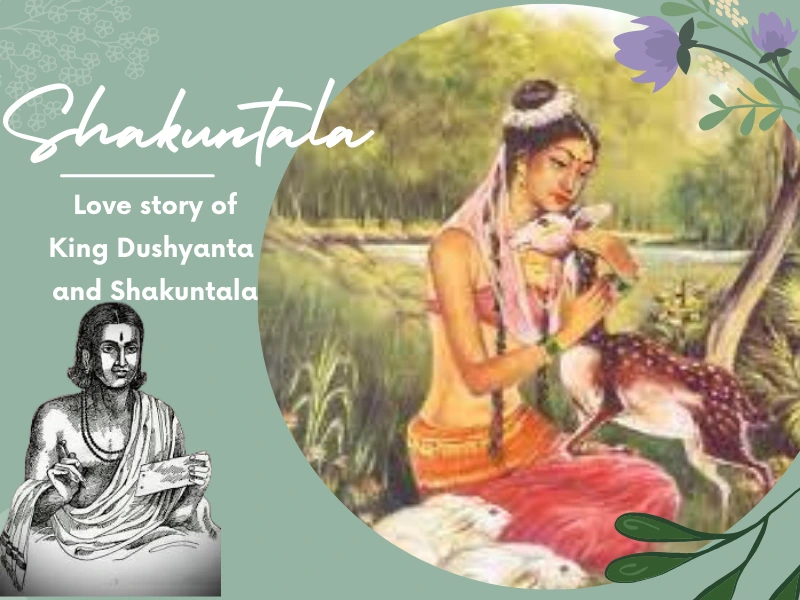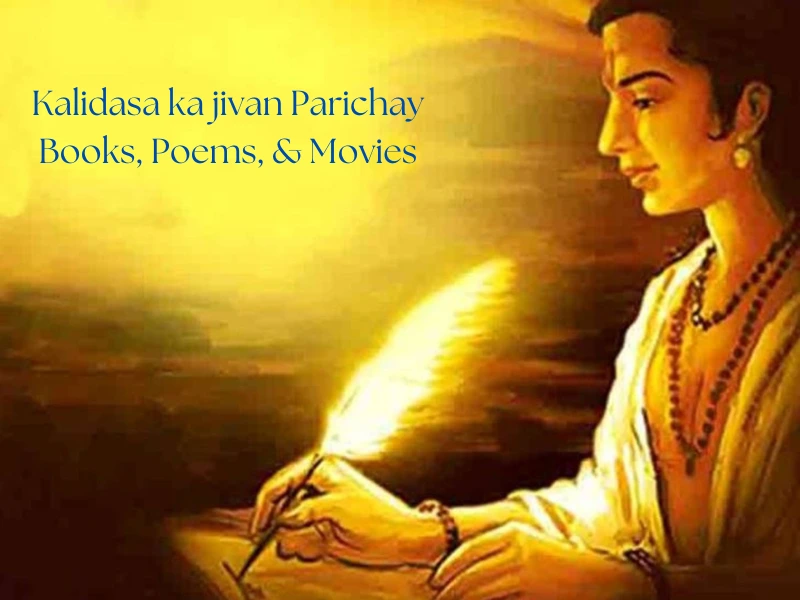Kalidasa, also known as the “Shakespeare of India,” is one of the greatest Sanskrit poets and dramatists in Indian history. Known for his poetic genius and dramatic artistry, Kalidasa’s works have withstood the test of time, continuing to inspire readers and scholars all over the world. His mastery over nature, emotions, and spirituality woven into his compositions makes him a towering figure in classical Indian literature.
Early Life of Kalidasa
Birth and Background
His early life is a dark mystery, and very little is known of it. He is known to have been a product of the Gupta era, sometime between the 4th and 5th centuries CE, known in history to be the Indian “Golden Age.” According to popular legends, Kalidasa was once an illiterate man, and his quality of mind and literary genius surfaced only after some miraculous grace of God or some kind of transformation that befell him.
Transformation into a Scholar
One popular legend narrates that Kalidasa married a learned princess who mocked his ignorance. Deeply hurt, he prayed to Goddess Kali, who blessed him with wisdom and poetic brilliance. After this transformation, Kalidasa went on to become one of the greatest literary figures in history.
Kalidasa’s Masterpieces
Famous Books by Kalidasa
Kalidasa is celebrated for his contributions to Sanskrit drama. His plays combine rich imagery, emotional depth, and cultural heritage. Notable works include:
- Abhijnanashakuntalam (The Recognition of Shakuntala):
- A romantic tale of King Dushyanta and Shakuntala, filled with love, separation, and divine intervention. It is his most famous work and has been translated into numerous languages.
- Vikramorvasiyam (Urvashi Won by Valor):
- A play that narrates the romantic relationship between King Pururavas and the celestial nymph Urvashi. The story explores the intersection of the mortal and divine worlds.
- Malavikagnimitram (Malavika and Agnimitra):
- This lighthearted play revolves around the love story of King Agnimitra and Malavika, a maidservant who turns out to be of royal lineage. It combines romance and comedy with poetic excellence.
Legacy of Kalidasa’s Books
Kalidasa’s works stand as timeless examples of Sanskrit literature, blending artistic expression with philosophical depth. They are celebrated for their:
- Influence: His writings have inspired poets, playwrights, and scholars across centuries and continue to be studied worldwide.
- Imagery: Exquisite descriptions of nature and emotions.
- Themes: Love, devotion, spirituality, and human relationships.

Poetry of Kalidasa
Kalidasa’s poetic works showcase his mastery of Sanskrit and his ability to evoke vivid imagery.
- Meghaduta (The Cloud Messenger):
- Description: A lyrical masterpiece, Meghaduta narrates the story of a Yaksha (demigod) who sends a love message to his wife through a passing cloud. The poem is celebrated for its vivid imagery, emotional depth, and depiction of nature.
- Key Features:
- Exquisite descriptions of landscapes, rivers, mountains, and seasons.
- Emotional resonance as it portrays longing and separation.
- Deep connection between human emotions and nature.
- Memorable Line:
- “O cloud, bearer of my message, as you travel across the land, spread joy and carry my love to her heart.”
- Raghuvamsha (The Dynasty of Raghu):
- Description: An epic poem that traces the lineage of the Raghu dynasty, including the life of Lord Rama. It glorifies the virtues of kingship, bravery, and dharma, making it a cornerstone of Indian classical literature.
- Key Features:
- Focus on kingship, valor, and dharma (duty).
- Celebrates the ideal qualities of rulers and the prosperity of their reigns.
- Written in a grand and majestic style.
- Memorable Line:
“The rulers of Raghu’s line were protectors of the earth, their fame spread as far as the sun’s rays.”
- Kumarasambhavam (The Birth of Kumara):
- Description: This epic poem describes the courtship and marriage of Lord Shiva and Goddess Parvati, culminating in the birth of Kumara (Kartikeya), the god of war. It blends romance, spirituality, and divine themes.
- Key Features:
- A blend of romance, devotion, and spirituality.
- Vivid depiction of love, austerity, and divine grace.
- Explores themes of penance, passion, and cosmic significance.
- Memorable Line:
- “Even the mountains bowed in reverence as Parvati’s love melted Shiva’s heart.”
Themes in Kalidasa’s Poetry
- Nature’s Beauty:
Kalidasa is known for using vivid imagery and natural elements to describe clouds, rivers, seasons, and mountains, reflecting an appreciation for nature and its elements. - Human Emotions:
Love, longing, separation, and devotion are central to his poetic works, making them timeless and relatable. - Spirituality and Philosophy:
Kalidasa blends spiritual concepts with everyday life experiences of humankind and celebrates how the divine makes a difference in the mortal world.
Also read Tulsidas ka Jivan Parichay
Influence on Indian and World Literature
Kalidasa’s Impact on Sanskrit Literature
Kalidasa elevated Sanskrit literature to new heights, setting a standard for poetic excellence. His works became a benchmark for literary and artistic expression in India.
Global Recognition of Kalidasa’s Work
Kalidasa’s writings have been translated into many languages, influencing poets and writers worldwide. Notable scholars like Goethe admired his work, particularly Abhijnanashakuntalam.
Kalidasa and the Gupta Period
Patronage of King Vikramaditya
Kalidasa is often associated with the court of King Vikramaditya, ruler of the Gupta dynasty. The king’s support allowed him to create some of his finest works, contributing to the cultural renaissance of the time.
Role in the Golden Age of India
The Gupta period is known for its advancements in art, literature, and science, and Kalidasa played a significant role in this flourishing cultural era.
Legacy of Kalidasa
Reverence in Indian Culture
Kalidasa is celebrated as a cultural icon in India. His works are frequently performed in classical dance, theater, and music, keeping his legacy alive.
Modern Relevance of Kalidasa
Even today, Kalidasa’s writings are studied for their artistic brilliance and philosophical depth. His ability to blend human emotions with universal themes makes his works timeless.
Conclusion
Kalidasa’s life and works represent the greatest achievement in Sanskrit literature and Indian cultural heritage. His poetic genius, rich imagery, and themes above time are what inspire every new generation. The epics, dramas, or lyrical poetry composed by him remain a source of inspiration within the literary circle.
Movies Inspired by Kalidasa’s Works
Kalidasa’s timeless literary masterpieces have inspired numerous films, showcasing his poetic brilliance and dramatic storytelling on the big screen. Here are some notable movies based on Kalidasa’s works:
1. Shakuntala
- Based on: Abhijnanashakuntalam (The Recognition of Shakuntala)
- Notable Adaptations:
- Shakuntala (1943): A Tamil movie directed by Ellis R. Dungan, widely acclaimed for its faithful depiction of the story.
- Shakuntala (1961): A Hindi film starring Anita Guha and Bharat Bhushan.
- Shaakuntalam (2023): A modern Telugu adaptation starring Samantha Ruth Prabhu, reimagining the love story of King Dushyanta and Shakuntala.
2. Meghasandesam (The Cloud Messenger)
- Based on: Meghaduta (The Cloud Messenger)
- Film Adaptation:
- Meghasandesam (1982): A Telugu film directed by Dasari Narayana Rao. While not a direct retelling, the movie takes inspiration from the theme of longing and the emotional tone of Kalidasa’s poem.
3. Mahakavi Kalidasa
- About Kalidasa’s Life:
- Mahakavi Kalidasa (1955): A classic Kannada movie starring Honnappa Bhagavathar. The film explores Kalidasa’s transformation from an uneducated man to a literary genius.
- Mahakavi Kalidasa (1960): A Tamil version of the Kannada film directed by R. R. Chandran, starring Sivaji Ganesan.
FAQs
What is Kalidasa famous for?
Kalidasa is famous for being one of ancient India’s greatest Sanskrit poets and dramatists, known for his works like Meghaduta and Abhijnanashakuntalam.
What are the two famous poems of Kalidasa?
Two of Kalidasa’s most famous poems are Meghaduta (The Cloud Messenger) and Raghuvamsha (The Dynasty of Raghu).
How did Kalidasa become intelligent?
According to legend, Kalidasa was initially uneducated but was blessed with wisdom and poetic brilliance by Goddess Kali after his sincere prayers.
When was Kalidasa born and died?
The exact dates of Kalidasa’s birth and death are unknown, but he is believed to have lived during the 4th–5th century CE, likely in the Gupta period.




It’s wonderful that you are getting thoughts from this
post as well as from our argument made here.
Excellent article. Keep writing such kind of info on your site.
Im really impressed by it.
Hello there, You’ve done a fantastic job. I’ll certainly digg it and personally recommend to my friends.
I’m confident they’ll be benefited from this web site.
Some genuinely wonderful articles on this web site, thanks for contribution. “Better shun the bait, than struggle in the snare.” by John Dryden.
An interesting discussion is value comment. I believe that you must write more on this matter, it might not be a taboo subject however typically people are not sufficient to speak on such topics. To the next. Cheers
Hello my loved one! I want to say that this post is awesome, nice written and include approximately all vital infos. I?¦d like to see extra posts like this .
Absolutely composed written content, regards for entropy.